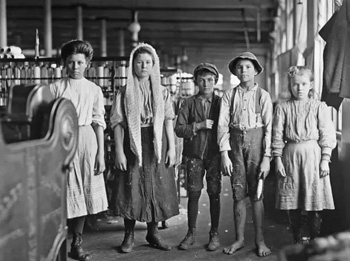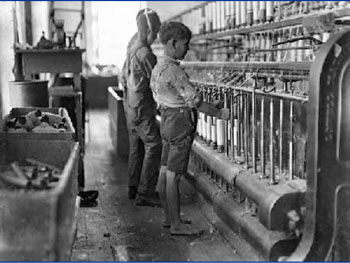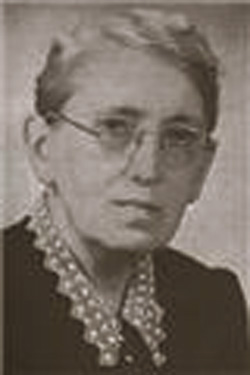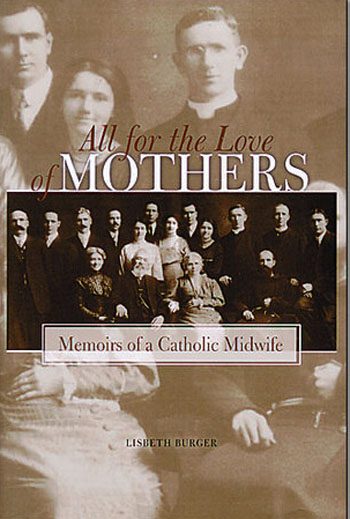Book reviews
 |
 |
 |
 |
 |
 |
 |
All for the Love of the Counter-Revolution
Book review of All for the Love of Mothers: Memoirs of a Catholic Midwife
by Lisbeth Burger, Lepanto Press: 2008, 305 pp.
by Lisbeth Burger, Lepanto Press: 2008, 305 pp.
This review is long overdue. Five years ago it was when I first purchased and read All for the Love of Mothers, by a Catholic midwife of Germany from the late 19th and early 20thcenturies.
From the moment I began reading it, I had the sense that I was reading the life of a strong, admirable woman. Lisbeth Burger, a countrywomen and contemporary of Empress Elizabeth I, wife of Emperor Franz Joseph and more commonly known as “Sissi.” After serving as a midwife for 40 years and delivering 2,283 children into the world, she committed to writing her memoirs of some of her most important cases.
Before she was a midwife, while still in school, she recalls, “The children used to crowd round me and beg: ‘Lisbeth, tell us a story.’” (p. 4) She would often comply with this request. She would use this gift later in life to recount in a vivid way with incredibly precise details some of the most powerful and shocking true stories of childbirth ever recorded.
Some of the stories recounted are heartwarming and encourage one to pursue heroic virtue and self-sacrifice. Other stories make one want to, in a manner of speaking, “jump through the pages” and flog this mother or that father, often both. Still others offer a first person perspective of living in the Industrial Revolution and its disastrous effect on marriages. As the woman entered the work force, she lost her place as queen of the home, often having lost the crown of chastity.
Also, Lisbeth's times illustrate how the Nobility fell prey to the revolutionary spirit. Instead of having gratitude to God for their noble status and trying to live up to the high ideals it represented, pride and strange new ideas – originated in France – of pursuing pleasure and living for the moment dominated their circles. Naturally, the peasant class who looked up to them became disillusioned, leaving them prey to the revolutionary spirit of equality that rode the winds in those days.
One effect of this new way of thinking among the upper classes was a loss of the respect for married life and the begetting and education of children, which was witnessed and imitated by the people of lesser means. As Fraulein Burger recalled, “The upper classes have learned from France that they needn’t have any (children). And, now, the smaller fry are copying them… And that, you see is the trouble: the small folk see what their betters do and they say to themselves: If those who can afford it don’t have children, why should we be troubled with them?” (p. 145)
This growing attitude is apparent in more than one of the memoirs of the author. Her Catholic response is a call to arms to win back what had been lost in so many as a consequence of this downward spiral in morals, namely virtue.
She dedicates a chapter to the need for a prolonged abstinence of marital relations after each birth due to complications the mother regularly experiences. In it she recommends the husband to forego even some of those innocent signs of affection lest he risk enkindling otherwise legitimate passions. (pp. 94-97) Brief lessons like this are common throughout the book.
Effects of the Industrial Revolution
Much could be said also about the Industrial Revolution and the loss of innocence in women before marriage mentioned above. One or two observations on each, however, should suffice to make the point.

 With regard to the Industrial Revolution, the book clearly demonstrates the strain it put on the relationships between factory workers and farmers. More than the detriment the factories caused to the crops of small farmers was the damage done in the homes of the employees of small factories. When the father lost his job because his factory was unsuccessful, the mother would enter the work place of factories, often returning to work days after childbirth.
With regard to the Industrial Revolution, the book clearly demonstrates the strain it put on the relationships between factory workers and farmers. More than the detriment the factories caused to the crops of small farmers was the damage done in the homes of the employees of small factories. When the father lost his job because his factory was unsuccessful, the mother would enter the work place of factories, often returning to work days after childbirth.
Even more harmful was the effect that children in the workforce had on the fabric of family life and the destruction on the proper order in the relationships between parents and their working children. As the author relates: “Suddenly the young people started going to the factories … sometimes (due to special aptitude and cleverness) they were paid more than their fathers. With the result that the parents became filled with such a tremendous respect for their offspring … that their authority was undermined. They had a sense of inferiority and defeat…The unity of the family was undermined.” (p. 158)
This insight reveals that the Industrial Revolution was more than simply a move “away from the land” and into the factories. It meant a moving away from the moral unity and hierarchy in the home and towards a new generation of young workers with little to no moral and religious training. The family unit became almost non-existent, according to the author, in a growing number of places at that time. The effects are felt even more keenly in our days.
The loss of purity in young women
We see this was an external cause of the Revolution. Another key internal cause of the Revolution is covered in the book and it also involves the destruction of family life. This is the loss of purity in young women before marriage. One of the most unnerving aspects of the book is the repeated times in which we witness the utter lack of respect of the husbands for their wives, even at the time immediately preceding the birth of a child.
 Lisbeth Burger pondered this situation and was having difficulty understanding the cause until she visited her principal at the Midwifery School, who told her: “A wife must be a queen and must enter wedlock wearing the crown of pure virginity … He [the husband] must be conscious all the time: she is better than I am … But if the wife has once slipped and does not enter wedlock as a virgin, then … she is dethroned even … if it was he who seduced her (for) he is conscious that the crown of purity is lacking and he ceases to respect her.” (pp. 103-104)
Lisbeth Burger pondered this situation and was having difficulty understanding the cause until she visited her principal at the Midwifery School, who told her: “A wife must be a queen and must enter wedlock wearing the crown of pure virginity … He [the husband] must be conscious all the time: she is better than I am … But if the wife has once slipped and does not enter wedlock as a virgin, then … she is dethroned even … if it was he who seduced her (for) he is conscious that the crown of purity is lacking and he ceases to respect her.” (pp. 103-104)
Years later, the husband of a woman whom, Lisbeth Burger had helped bring into the world, added: “Chastity before marriage… If we could restore this to the human race, 90% of the marriage problems would be solved.” (p. 211)
To this reader, the author's character seemed ideal for being a midwife. It is difficult not to admire her patience, discretion, understanding of her vocation and undying love for the little children she helped bring into the world. As she put it, some people may only consider the midwife a necessary evil, but she understood it as a vocation: She never grew tired of carrying each baby she had helped to deliver up to the altar to be given to the godmother to be baptized by the priest.
 She considered each child in a way as her own and treated them all with the care, tenderness, and solicitude that he needed, regardless of the worthiness of the parents. As she relates: “Even in homes where the child was not wanted, I was glad to be there … I always fancy that the way in which a child is received into the world must influence its attitude toward its fellow man later on. After all, the child is a messenger of God, and comes into life with a very special mission from God.” (p. 79)
She considered each child in a way as her own and treated them all with the care, tenderness, and solicitude that he needed, regardless of the worthiness of the parents. As she relates: “Even in homes where the child was not wanted, I was glad to be there … I always fancy that the way in which a child is received into the world must influence its attitude toward its fellow man later on. After all, the child is a messenger of God, and comes into life with a very special mission from God.” (p. 79)
There were many times in which the child, indeed, was not wanted, but must have felt wanted by the midwife, the first person the baby had contact with. In another place, she noted she felt a certain responsibility to give the child a warm welcome, believing that this first impression on the infant, even if he did not acknowledge it, could in some way foster a healthy development of character.
I believe that All for the Love of Mothers should be read by anyone interested in increasing his understanding about how we reached our times and also in learning better how to fight for the cause of the Counter-Revolution, especially for those considering the vocation to Holy Matrimony.
Lisbeth Burger may not have called it that at the time, but, as anyone who has read her memoirs can tell you, she was a faithful trench soldier for this most important and necessary work, a good and faithful servant whose book can be a great help to those fighting for the Catholic cause today.
Read an objection to this book-review

From the moment I began reading it, I had the sense that I was reading the life of a strong, admirable woman. Lisbeth Burger, a countrywomen and contemporary of Empress Elizabeth I, wife of Emperor Franz Joseph and more commonly known as “Sissi.” After serving as a midwife for 40 years and delivering 2,283 children into the world, she committed to writing her memoirs of some of her most important cases.
Before she was a midwife, while still in school, she recalls, “The children used to crowd round me and beg: ‘Lisbeth, tell us a story.’” (p. 4) She would often comply with this request. She would use this gift later in life to recount in a vivid way with incredibly precise details some of the most powerful and shocking true stories of childbirth ever recorded.
Some of the stories recounted are heartwarming and encourage one to pursue heroic virtue and self-sacrifice. Other stories make one want to, in a manner of speaking, “jump through the pages” and flog this mother or that father, often both. Still others offer a first person perspective of living in the Industrial Revolution and its disastrous effect on marriages. As the woman entered the work force, she lost her place as queen of the home, often having lost the crown of chastity.
Also, Lisbeth's times illustrate how the Nobility fell prey to the revolutionary spirit. Instead of having gratitude to God for their noble status and trying to live up to the high ideals it represented, pride and strange new ideas – originated in France – of pursuing pleasure and living for the moment dominated their circles. Naturally, the peasant class who looked up to them became disillusioned, leaving them prey to the revolutionary spirit of equality that rode the winds in those days.
One effect of this new way of thinking among the upper classes was a loss of the respect for married life and the begetting and education of children, which was witnessed and imitated by the people of lesser means. As Fraulein Burger recalled, “The upper classes have learned from France that they needn’t have any (children). And, now, the smaller fry are copying them… And that, you see is the trouble: the small folk see what their betters do and they say to themselves: If those who can afford it don’t have children, why should we be troubled with them?” (p. 145)
This growing attitude is apparent in more than one of the memoirs of the author. Her Catholic response is a call to arms to win back what had been lost in so many as a consequence of this downward spiral in morals, namely virtue.
She dedicates a chapter to the need for a prolonged abstinence of marital relations after each birth due to complications the mother regularly experiences. In it she recommends the husband to forego even some of those innocent signs of affection lest he risk enkindling otherwise legitimate passions. (pp. 94-97) Brief lessons like this are common throughout the book.
Effects of the Industrial Revolution
Much could be said also about the Industrial Revolution and the loss of innocence in women before marriage mentioned above. One or two observations on each, however, should suffice to make the point.

Youth entering the 'work force' at the turn of the century

Even more harmful was the effect that children in the workforce had on the fabric of family life and the destruction on the proper order in the relationships between parents and their working children. As the author relates: “Suddenly the young people started going to the factories … sometimes (due to special aptitude and cleverness) they were paid more than their fathers. With the result that the parents became filled with such a tremendous respect for their offspring … that their authority was undermined. They had a sense of inferiority and defeat…The unity of the family was undermined.” (p. 158)
This insight reveals that the Industrial Revolution was more than simply a move “away from the land” and into the factories. It meant a moving away from the moral unity and hierarchy in the home and towards a new generation of young workers with little to no moral and religious training. The family unit became almost non-existent, according to the author, in a growing number of places at that time. The effects are felt even more keenly in our days.
The loss of purity in young women
We see this was an external cause of the Revolution. Another key internal cause of the Revolution is covered in the book and it also involves the destruction of family life. This is the loss of purity in young women before marriage. One of the most unnerving aspects of the book is the repeated times in which we witness the utter lack of respect of the husbands for their wives, even at the time immediately preceding the birth of a child.

Women leave their homes to work in a garment factory
Years later, the husband of a woman whom, Lisbeth Burger had helped bring into the world, added: “Chastity before marriage… If we could restore this to the human race, 90% of the marriage problems would be solved.” (p. 211)
To this reader, the author's character seemed ideal for being a midwife. It is difficult not to admire her patience, discretion, understanding of her vocation and undying love for the little children she helped bring into the world. As she put it, some people may only consider the midwife a necessary evil, but she understood it as a vocation: She never grew tired of carrying each baby she had helped to deliver up to the altar to be given to the godmother to be baptized by the priest.

Lisbeth Burger
There were many times in which the child, indeed, was not wanted, but must have felt wanted by the midwife, the first person the baby had contact with. In another place, she noted she felt a certain responsibility to give the child a warm welcome, believing that this first impression on the infant, even if he did not acknowledge it, could in some way foster a healthy development of character.
I believe that All for the Love of Mothers should be read by anyone interested in increasing his understanding about how we reached our times and also in learning better how to fight for the cause of the Counter-Revolution, especially for those considering the vocation to Holy Matrimony.
Lisbeth Burger may not have called it that at the time, but, as anyone who has read her memoirs can tell you, she was a faithful trench soldier for this most important and necessary work, a good and faithful servant whose book can be a great help to those fighting for the Catholic cause today.

Posted August 16, 2017
______________________
______________________
 Volume I |
 Volume II |
 Volume III |
 Volume IV |
 Volume V |
 Volume VI |
 Volume VII |
 Volume VIII |
 Volume IX |
 Volume X |
 Volume XI |
 Special Edition |



